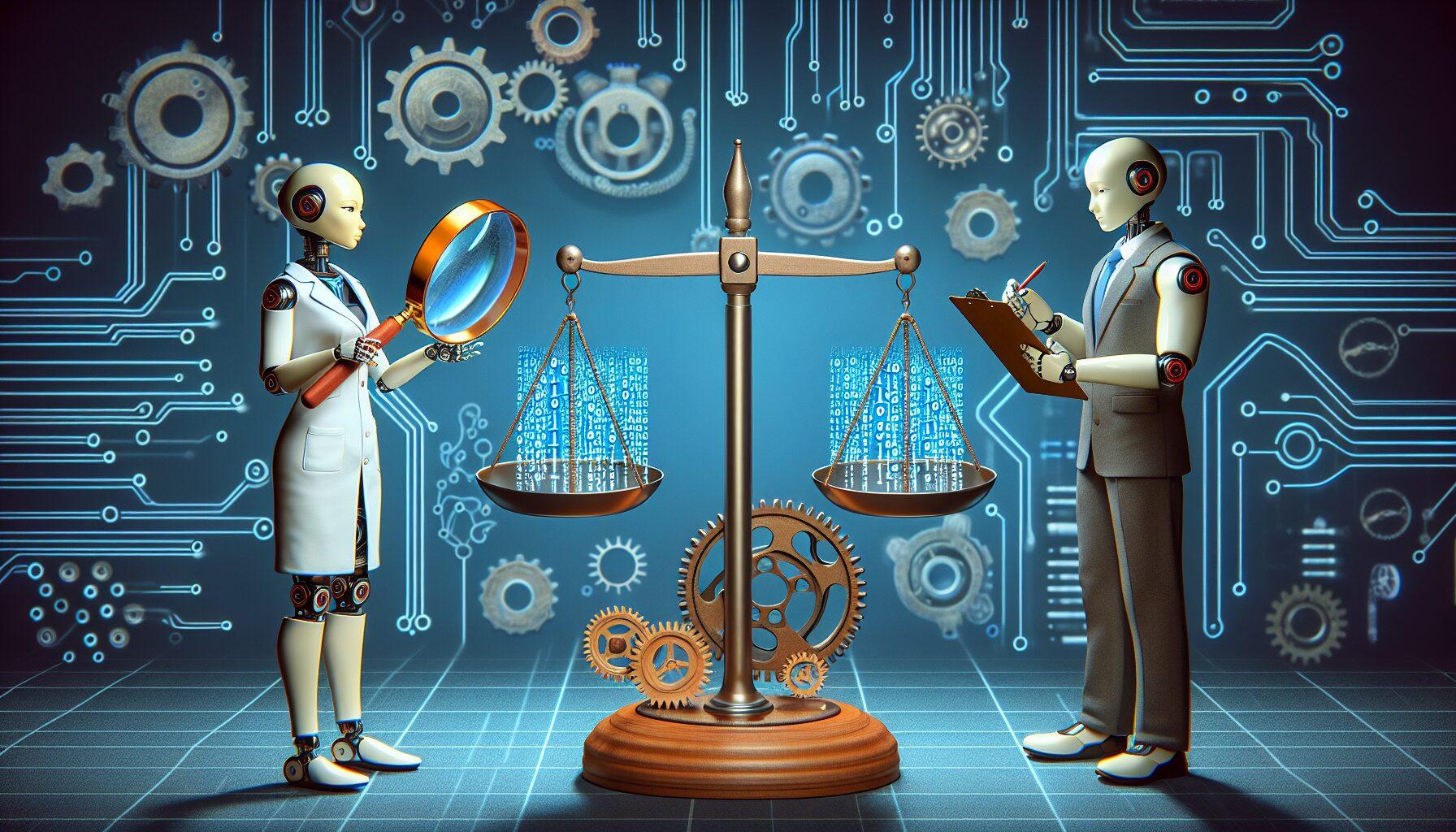Accountability in AI
As AI systems increasingly permeate our lives, personalizing user experiences and decision-making processes, the need for accountability becomes paramount. It’s essential to ensure that these systems are transparent, fair, and operate without bias.
This means not only scrutinizing the data that feeds into AI but also understanding the algorithms that drive their decisions. Only by holding AI to strict standards of accountability can we foster trust and confidence in these systems, ensuring they serve the public interest and enhance our daily lives without infringing on our rights and freedoms.
Hey there! Have you ever puzzled how AI impacts our lives, particularly in the realms of social media and well being care? It’s a captivating matter, and at this time, we’re diving into the nitty-gritty of accountability, transparency, and ethics in AI. Let’s chat about how these rules play a vital function in making AI a pressure for good!
What’s the Big Deal About AI in Social Media and Health Care?

AI personalization is transforming the landscape of social media and health care by offering tailored experiences and insights that were once unfathomable. On social media platforms, algorithms analyze user behavior to curate content feeds, predict preferences, and even influence social interactions, creating an echo chamber uniquely catered to each individual.
Meanwhile, in health care, AI-driven personalization goes beyond mere convenience; it promises more accurate diagnoses, personalized treatment plans, and proactive health management, all while navigating the complex web of patient data privacy and consent.
This dual-edged sword of hyper-personalization raises critical questions about the balance between beneficial customization and the potential risks of data misuse and algorithmic bias. AI is like that pal who one way or the other is aware of precisely what you want earlier than you even ask.
In social media, it is the magic behind your personalised feed. In well being care, it is the key weapon for early illness detection. But as with every highly effective software, utilizing AI responsibly is essential. Let’s break down why accountability, transparency, and ethics matter a lot.
Accountability: Who’s Responsible?
When AI systems make decisions that impact human lives, pinpointing responsibility for those decisions is paramount. If an AI personalization algorithm leads to a negative outcome, such as reinforcing harmful biases or overlooking critical information, it’s crucial to determine who is accountable—is it the developers, the users, or the AI itself?
Establishing clear lines of accountability ensures that there are mechanisms in place to address any issues that arise, and helps maintain trust in the technology we rely on so heavily. When AI makes choices, who takes the autumn if one thing goes incorrect?
That’s the place accountability comes in. In social media, AI algorithms resolve what content material you see. If misinformation spreads, who’s accountable? Similarly, in well being care, AI helps diagnose illnesses. But if there is a misdiagnosis, who’s accountable? Ensuring accountability means having clear roles and duties, so there’s all the time somebody to reply for AI’s actions.
Tip Box:
🔍 Check the Source: Moreover, as AI personalization becomes more prevalent, the ethical considerations of data privacy come to the forefront. Users often trade their personal information for tailored experiences, but this exchange must be handled with the utmost care to protect against misuse.
Transparency is key—companies must clearly communicate how they collect, use, and safeguard user data to maintain trust and comply with increasingly stringent data protection regulations. Always query the place info comes from on social media. Reliable sources can assist battle misinformation!

Transparency: Seeing Through the AI Curtain
Building on the foundation of trust and transparency, AI personalization must be executed with a clear ethical framework in mind. This involves not only adhering to privacy laws but also ensuring that algorithms are free from bias and that decisions are explainable to the end-user.
Companies leveraging AI must commit to continuous monitoring and updating of their systems to address potential ethical issues and to ensure that personalization enhances user experiences without compromising individual rights or autonomy. Imagine in case your favourite social media app all of the sudden began appearing bizarre, and you had no concept why.
Transparency means being clear about how AI makes choices. It’s like having a map that exhibits you the journey your information takes. In well being care, transparency can assist sufferers perceive how AI contributes to their remedy plans, constructing belief in these digital methods.
Ethics: Doing the Right Thing
Ensuring ethical AI personalization also demands adherence to privacy standards and the responsible handling of data. As AI systems learn from individual behaviors and preferences to deliver tailored experiences, they must do so without compromising the confidentiality and integrity of user data.
This balance of personalization and privacy is crucial in maintaining user trust and fostering a responsible AI ecosystem where personalization serves as a benefit, not a breach of individual rights.
AI must be like that smart pal who all the time has your again. Ethics in AI ensures that these methods are designed and used in methods which might be truthful and simply.
For instance, an AI system in well being care ought to present the identical high quality of prognosis to everybody, no matter background. Similarly, social media algorithms ought to promote constructive interactions reasonably than simply sensational content material.
Real-World Examples: Learning from Real Life
Case Study: Social Media and Misinformation
To address the issue of misinformation, several social media platforms have begun implementing AI-driven personalization algorithms designed to filter out fake news and elevate credible sources.
These systems are constantly learning from user interactions, flagging content that is misleading or factually incorrect. By prioritizing accuracy and trustworthiness, these AI tools aim to create a healthier information ecosystem where users can make informed decisions based on reliable data.
Remember the final time you noticed a viral submit that turned out to be false? Social media giants at the moment are utilizing AI to deal with misinformation by flagging or eradicating false content material. However, attaining accountability and transparency in these methods remains to be a piece in progress.
Health Care: AI in Diagnostics
In the realm of health care, AI’s prowess in diagnostics is revolutionizing patient care. Sophisticated algorithms are analyzing medical images with a precision that rivals, and in some cases exceeds, that of human experts. This not only accelerates the diagnostic process but also enhances the accuracy of detecting diseases at early stages, when they are most treatable.
As these systems learn from vast datasets of patient histories and outcomes, they continually refine their predictive capabilities, offering a glimpse into a future where personalized treatment plans are the norm, tailored to the unique genetic makeup and lifestyle of each individual.
AI’s skill to investigate huge quantities of knowledge helps medical doctors detect illnesses early. For instance, AI methods have been used to establish early indicators of diabetic retinopathy, a number one explanation for blindness. Ensuring these methods are ethically designed can save lives whereas respecting affected person privateness.
Get Involved: How Can You Make a Difference?
Poll:
🤔 How a lot do you belief AI in your day by day life?
- Completely
- Somewhat
- Not in any respect
Join the dialog and share your ideas!

Call-to-Action: Let’s Shape the Future Together!
In the realm of AI personalization, your voice is crucial. Every interaction, every click, and every preference you share helps to train these intelligent systems to serve you better.
But it’s not just about improving convenience or streamlining services; it’s about crafting experiences that truly resonate with your individual needs and values.
By participating in discussions, providing feedback, and staying informed about AI developments, you play an active role in guiding the evolution of technology that’s becoming increasingly intertwined with our daily lives.
Let’s collaborate to ensure AI personalization works for everyone, safeguarding our unique human elements while embracing the benefits of advanced technology.
Want to dive deeper into how AI is reshaping industries? Check out our article on AI Innovations in Health Care and see the longer term we’re constructing collectively. Let’s guarantee AI stays a pressure for good by advocating for moral practices in its improvement and use.
Final Thoughts
AI personalization is not just a fleeting trend; it’s the bedrock of a new era in customer experience. As we harness sophisticated algorithms to tailor content, recommendations, and interactions to individual preferences, we’re witnessing a paradigm shift in how businesses engage with their users.
By prioritizing a user-centric approach, AI is empowering companies to forge deeper, more meaningful connections with their audience, ensuring that each interaction is as unique as the individual at the heart of it. AI is an unbelievable software that may remodel lives, but it surely must be used responsibly.
By understanding and advocating for accountability, transparency, and ethics, we can harness its energy for the good thing about all. So, let’s keep knowledgeable, ask questions, and work collectively to create an AI-driven future that’s truthful and simply for everybody.
